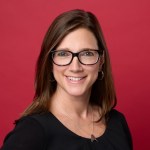
With the arrival of spring, we find ourselves in a moment of reflection and renewal—a perfect time to pause and share some updates on our disability inclusion journey.
At the beginning of last year, we recognized that our work in this area could only be successful if it was part of a vision that the entire foundation believed in and could work toward together, one that we could use to hold ourselves accountable (and ask our partners to do the same). And so we identified two overarching goals for the next five years: First, to make the foundation’s grantmaking and operations fully inclusive of disabled people. Second, to make strides in ensuring that the broader philanthropic field—as well as the social justice fields we and our peer funders work in and serve—include the rights of disabled people. We know these are ambitious goals, but given the tremendous inequalities faced by people with disabilities, our only option is to be ambitious.
Transforming our grantmaking
2018 brought major changes to our grantmaking practice, and grants awarded. Early on, we’d decided that, true to the inclusive ethic of this work, disability inclusion would be embedded throughout our grantmaking in all areas—through changes in our grants process, staff learning, and technical assistance—rather than creating a new, standalone program. We continue to revisit the grantmaking process to ensure accessibility and inclusion, and we’re working with third-party vendors, like Fluxx, to improve the accessibility of our systems and processes. As we work toward full inclusivity in this area, the foundation is offering proposal and report forms in accessible formats.
These changes have resulted in almost $9 million in funding for disability-specific work (that is, organizations or projects focused primarily on disability), with Ford programs and regional offices meeting concrete targets for disability grantmaking within their existing strategies. The grants tackle issues ranging from criminal justice reform to environmental justice, and sexual and reproductive health and rights to internet standards. What we’re learning from these grantees is helping us see our work from new angles. For example, a grant to the Global Greengrants Fund is strengthening the inclusion of people with disabilities in efforts to tackle our world’s most pressing environmental issues. The grant is highlighting the agency and power of people with disabilities, shifting power dynamics, and demonstrating how disability inclusion accelerates impact. Meanwhile, in the US, our Technology and Society program is supporting work to explore the unique risks and discriminatory impact of artificial intelligence (AI) on disabled people—who are increasingly likely to have experiences with AI decision-making, but have been largely left out of the debates about how AI might replicate and exacerbate bias.
These grants are also informing our approach to helping our grantees more intentionally include people with disabilities in their work. Our BUILD team, as well as teams working on Civic Engagement; Gender, Racial, and and Ethnic Justice; and Creativity and Free Expression; are collaborating with disability leaders to help social justice organizations learn about disability inclusion and intersectionality, and provide best practices toward inclusion. In this way, we hope to help move social justice fields toward truly advancing justice for all.
Changing our culture
Across the foundation, inclusion is increasingly becoming everyone’s responsibility. One of the joys of the past year has been what we call the “FYI emails,” where we learn about our colleagues’ own efforts to contribute to this work. In one such email, our CFO shared that everyone’s business cards will now be made with braille. A program team let us know that following a meeting, a disabled participant remarked that it had been one of the most welcoming she’d ever experienced, hosted by an organization not entirely or explicitly focused on disability. Our Creativity and Free Expression team told us about their plans to engage disability leaders to train staff not only about combating ableism in the arts, but about embracing access and inclusion as a way of serving the creative process.
We are also making progress in more targeted areas. Our colleagues in Talent and Human Resources are implementing changes that were recommended following an audit of our talent acquisition practices, including seeking new sources for candidates, launching a new disability accommodations process, and incorporating disability into our onboarding. Our newly reopened headquarters building—the Ford Foundation Center for Social Justice—embraces best-in-class standards for accessibility.
While it’s sometimes daunting, we know that making progress in any one of these areas depends on making progress in another. Attracting the best talent, in a way that’s inclusive of all individuals, is only possible if we continue to make our physical space, technology platforms, and institutional culture more accessible and welcoming.
Learning and questioning
This area of work remains new, and we still have a lot of learning to do. With that in mind, we will continue to support learning across the foundation, hosting discussions with disability leaders, promoting best practices for accessible and inclusive meetings, and ensuring that our communications “talk the talk” of disability justice.
And we will continue to look critically and honestly at ourselves. We know that urgency and competing priorities sometime hamper our disability inclusion efforts, and that engaging in this rigorous, long-term work requires sustained energy, internal reflection, and significant changes in the ways we work. This means ensuring, for example, that we have the time and resources to ensure that disability accommodations are a priority and not an afterthought—and that everyone acknowledges that they are central to the work of disrupting inequality. As an institution, the foundation is taking action to acknowledge the ways ableism can be embedded in our organizational practices. Later this spring, staff will have an opportunity to attend an anti-ableism training and deepen our understanding of intersecting oppressions.
In all of this, we are lucky to have have significant support from the foundation’s leadership, as well as from champions across the foundation who have brought further energy and initiative. We encourage creative approaches and make a point of celebrating the successes and rewards of this work, whether it’s our building’s facilities team enthusiastically learning more about the diversity of disability, or a program officer carefully exploring the most strategic ways to engage in disability grantmaking. One of our colleagues has adopted a phrase for this: “joy equity.”
Building community, strengthening partnerships
The Ford Foundation is just part of a wider landscape of social justice funders and organizations, and we must all work together to truly turn the tide. And so, as long as donors continue to tell our grantees “we don’t do disability,” we will devote significant resources to catalyzing change within the philanthropic sector. Last summer, we hosted a pioneering daylong convening of 50 foundation executives interested in learning and committing to greater disability inclusion. Following that meeting, we created a funder-only online resource hub called the Disability Philanthropy Forum, which now has over 200 members. (Folks in philanthropy can sign up to access it by visiting the site!) It includes an exciting series of videos focused on disability justice, available to Forum members. You can watch one of them here:
Accessibility Statement
- All videos produced by the Ford Foundation since 2020 include captions and downloadable transcripts. For videos where visuals require additional understanding, we offer audio-described versions.
- We are continuing to make videos produced prior to 2020 accessible.
- Videos from third-party sources (those not produced by the Ford Foundation) may not have captions, accessible transcripts, or audio descriptions.
- To improve accessibility beyond our site, we’ve created a free video accessibility WordPress plug-in.
As part of our efforts to make sure our communications “talk the talk” of disability justice, the series of videos we created for the Forum made accessibility part of the production from the beginning, rather adding them on once the piece was finished. In the video above, these elements include on-screen text and participants who describe their visual appearance; an SRT file is also available for those using a screen-reader.
Together with Richard Besser, president of the Robert Wood Johnson Foundation, Ford’s president Darren Walker is co-chairing the President’s Council on Disability Inclusion in Philanthropy, launched in late March. With 13 other foundation presidents, Council members make a collective commitment to elevate disability inclusion within philanthropy, and advance it within their own foundations. Part of that commitment includes the Disability Inclusion Fund, a $10 million participatory collaborative fund focused on the US disability justice movement.
In the world at large, we continue to fight engrained social norms and discrimination that often complicates our work—and always adds fuel to it. We are excited to be moving this work forward with so much interest, support, and honesty from our colleagues and peers, and will continue to be transparent about how our efforts are progressing.

